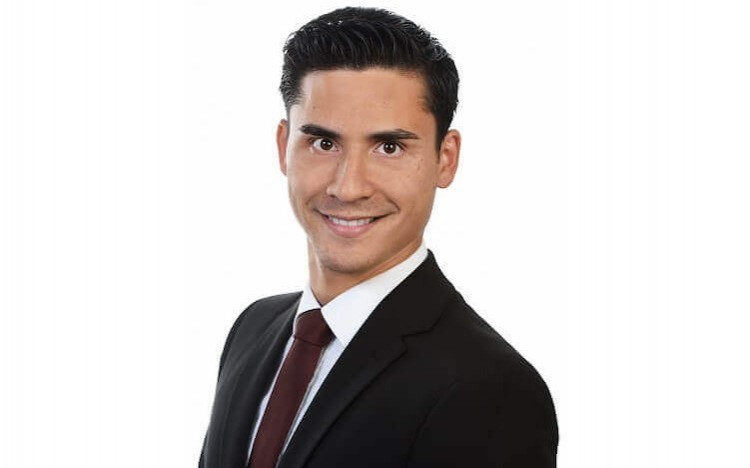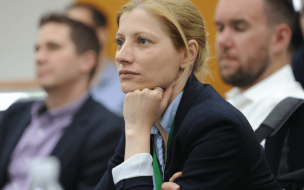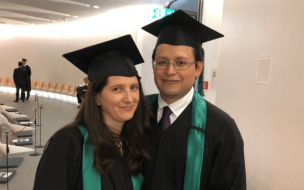Germany is the fourth-largest economy in the world. It offers MBA grads ample opportunities to accelerate their careers in some of the country’s most successful industries. These include the chemical sector, finance, and the automotive industry—Germany’s is the largest in Europe.
Located in a high valley in the north-east of Switzerland, St. Gallen is a picturesque town a far cry from busy German financial and industrial centers like Frankfurt and Munich.
Yet alumni from the MBA program at the University of St. Gallen (HSG) have realized that the school can open doors to a variety of careers in Germany, despite the school being based in Switzerland.
In fact, getting an MBA from St Gallen can set students at an advantage. St. Gallen is currently ranked the fourth best business school in Europe by the Financial Times and number one in the German-speaking region—a distinction it’s held for many consecutive years.
While it has an intimate class size (there are just 48 students in this year’s cohort), 84 nationalities are represented in St Gallen’s MBA alumni network, making for a strong international community of like-minded MBA grads.
We spoke to four alumni from the University of St. Gallen to find out how their MBA has helped them advance their careers in Germany.
“St. Gallen enjoys an unparalleled reputation in the German-speaking world”—Swapnadeep Bhattacharyya, MBA ‘15

Swapnadeep is originally from India, where he spent five years working for consulting firms such as Deloitte, KPMG, and McKinsey.
He wanted to pursue a one-year MBA program that would offer him greater career progression, and St. Gallen “checked all the boxes,” he says. “The small class size, individualized attention, and strong reputation were the reasons why I ended up favoring it over others in the German speaking region,” Swapnadeep adds.
When it came to pursuing graduate roles in Germany, Swapnadeep realized the value of his MBA from the University of St. Gallen.
“Employers interviewing me at the time seemed to value my St. Gallen background as much as my prior credentials as a consultant,” he says. “I would have probably found it more much harder to gain access to relevant positions in Germany without the credentials of the St. Gallen MBA.”
After his MBA, Swapnadeep secured a position in Dusseldorf at METRO AG, an international leader in the wholesale industry and, four years on, he’s just been promoted to director of strategy and corporate development for the company.
“St. Gallen enjoys an unparalleled reputation in the German-speaking world,” Swapnadeep explains. “The overall recognition of the St. Gallen brand, strong alumni network, and proximity to the German market make HSG the preferred destination for business grads looking to build a career in Germany.”
Over recent years, 18% of full-time graduates are now working in Germany—Dominik Nittner, MBA ‘16

Dominik started out in the finance industry as an intern at the second-largest bank in Germany, and was eventually made assistant vice president. For him, an MBA offered a way into financial consultancy, and with the DACH area (Germany-Austria-Switzerland) being the largest financial services consulting market outside the US, choosing a school in its center made sense.
Crucially, Dominik was also looking for an international MBA environment in order to adapt more successfully to the inherently international environment of consulting. In his year’s MBA cohort at St. Gallen, students came from 22 nationalities and over 15 different industries, offering Dominik a unique environment to enhance his business skills.
He remembers one class in which he had to work with a peer who was a professional violinist, a telling example of the diversity of the St. Gallen student population. In Dominik’s eyes, this was a way for him to develop his soft skills and see problems from a more creative perspective—important skills for anyone in the consulting industry.
Now, Dominik is a manager at Monitor Deloitte in Munich, a position he says that St. Gallen was instrumental in helping him achieve. MBA students at St. Gallen have structured opportunities to meet with companies in nearby Munich, including an annual trip to the city. MBAs also have interviews facilitated with international companies for Corporate Projects in Germany.
Over the past four years, on average 18% of reported post-MBA jobs are secured in Germany by graduates of the full-time program at St. Gallen. According to MBA officials, the historical percentage of graduates employed in Germany would likely rise even higher if the part-time program were measured too, given the high numbers of Germany-based participants annually.
“The school was a door-opener for multiple job offers in Germany”—Katharina Teipel, MBA ‘18
“Deciding to do an MBA is a big deal,” reflects Katharina. “Given the effort and money I would put into this journey, I wanted to have one of the best and internationally renowned schools and brands on my resume.”
Originally from Germany, Katharina was looking for a school close to her home of Munich, as well as one with a smaller MBA community: “the boutique-style character of St. Gallen creates a familiar ambiance,” she says.
“The MBA team knows you quite well after a short time, can provide continuous feedback, and follows your development path very closely.”
Before starting her MBA, Katharina was working as a project manager for a large insurance company, but afterwards, she was promoted to a new position within the same company: “a completely new technical role with a lot more responsibility,” she explains.
She says it was her St. Gallen MBA that really made the difference when it came to securing this new position. “For me, the school was a door-opener for various interviews and multiple job offers in Germany and Switzerland.”
“My MBA from the University of St. Gallen gave me the confidence to take on new challenges, dissect what is strategically relevant to make an educated decision, and learn very fast.”
Read: How An MBA In Switzerland Can Unlock A Wealth Of Careers—From Luxury To Retail
© St. Gallen University
“Germany offers a wide range of jobs and a great quality of life”—Stephan Bögner, MBA ‘17
When Stephan was looking for an MBA, he wanted “a program that offered more than the typical mix of strategy and finance courses.”
Stephan had already worked on projects in Switzerland as a technology consultant. He knew the career opportunities afforded by St. Gallen in the Swiss market were strong, but he found its power in Germany could help him make big career changes there too. “St. Gallen’s reputation worked as a conversation starter outside of my own industry, allowing me to build a more diverse network,” he says.
Of St. Gallen’s 2018 MBA cohort, almost half (44.7%) completed a ‘double change’ upon graduating, switching two factors from industry, function, and country. 21% succeeded in achieving the infamous ‘triple jump’—changing all three.
Stephan is now working as a solutions consultant for a computer software firm in Munich, and advises other MBAs to consider Germany for their future business careers.
“MBAs should keep their career options post-graduation open in general, including what country they relocate to,” he recommends. “Germany offers a wide range of jobs, a stable society, and a great quality of life.”









